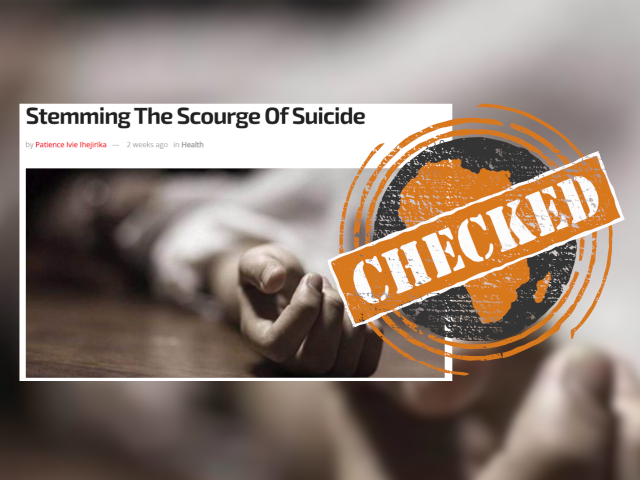This article is more than 4 years old
- A newspaper ad made two shocking claims about how many women would be raped in their lifetime, and how few rapists were convicted for their crimes.
- There is too little data available to conclude that 40% of South African women will be raped in their lifetime. Experts told Africa Check that studies are outdated and too limited in their scope.
- A 2012 study by the medical research council tracking 3,952 rape cases did find that only 8.6% ended in a guilty verdict. But this does not mean that 8.6% of all rapists are convicted.
The advert also claims that “it is estimated that 40% of South African women will be raped in their lifetime and only 8.6% of rape perpetrators are convicted”.
Rape in South Africa often makes headlines. According to the most recent crime statistics, 41,583 rapes were reported to the police in the financial year 2018/19.
Does that mean 40% of South African women will be raped in their lifetime, but only 8.6% of rapists are convicted? We checked.
Zeenat Hendricks, communications coordinator for Rape Crisis, pointed us to two publications for the source of the statistics in the advert.
The first was a 2016 opinion piece in the now defunct New Age newspaper. It was written by Nonhlanhla Sibanda, then project coordinator for the non-profit People Opposing Women Abuse.
Sibanda wrote: “Although actual statistics are not known, it is estimated that more than 40% of South African women will be raped in their lifetime.” We contacted her about the source of this statistic, but did not get a response.
The second source Rape Crisis pointed us to was a 2017 report titled Rape Justice in South Africa by the South African Medical Research Council. But it does not include the statistic that 40% of South African women will be raped in their lifetime.
Research on rape statistics is limited and out of date
Research on the share of South African women who have been – or will be – raped is limited.
A 2010 study by non-profit organisation Gender Links estimated that 25.3% of women in Gauteng province had been “raped by a man, whether a husband or boyfriend, family member, stranger or acquaintance”. The study used a representative sample of 511 women.
A similar study, conducted in the Western Cape province in 2014, found that 7% of women reported non-partner rape. Both these studies provide insight into the problem, but they don’t represent the whole country. They can only tell us about the situation in a certain province at a particular time.
The only national estimate available is from 1998. Then South Africa’s Demographic and Health Survey found that 4.4% of women aged 15 to 49 had been “forced to have sex” in their lifetime. But this figure is over 20 years old and was only for a portion of the female population.
Accurate rape statistics ‘difficult to produce’
Accurate statistics on rape are difficult to produce because of the high cost of producing methodologically sound studies, gender-based violence researcher Lisa Vetten told Africa Check. Researchers also disagree on which method of research produces the most accurate results.
“Far too many of our studies look at women of reproductive age only. So we tend not to have information about what’s happening with older women,” Vetten said. This was the case in the 1998 Demographic and Health Survey.
“What they also don’t do, and can’t do, is interview women in prison or other institutions where it’s hard to access individuals. So studies will always underestimate and not take into account key populations.”
Vetten said that accurate rape statistics were important in determining the extent of the problem.
“I think it’s also very important from a distribution of resources point. A politician wants to know how big a problem is before they spend money on it.”
Many rape victims do not report the crime due to stigma, a lack of support from their communities and a distrust in the police, said Nomfundo Mogapi, clinical psychologist and programme manager at the Centre for the Study of Violence and Reconciliation in Johannesburg, South Africa.
Both Vetten and Mogapi said they were not aware of any study that estimated that “40% of South African women will be raped in their lifetime”. The available data is dated and not nationally representative.
One of the sources provided by Rape Crisis was Rape Justice in South Africa, a 2017 report by the South African Medical Research Council. The study, conducted in 2012, tracked 3,952 rape cases from 170 randomly selected police stations across the country’s nine provinces.
The majority of the complainants were female (94.1%). Most of the alleged perpetrators of rape were male (99%).
8.6% of cases ended with guilty verdict
The study tracked the rape cases through the criminal justice system. Of the 3,952 cases, arrests were made in 57% of cases. Of the original cases, 65% were referred for prosecution. Trials were started in just 18.5% of cases.
The study found that only 8.6% of cases concluded with a guilty verdict. Neither Mogapi nor Vetten were aware of any more recent studies.
Statistic is for reported cases
But the statistic only speaks to the percentage of reported rape cases that end in convictions, said Vetten. It cannot be applied to all “rape perpetrators”, as not all crimes are reported.
Research on the percentage of rapes that are reported to the police in South Africa is limited.
The 2010 study in Gauteng estimated that just 3.9% of women who had been raped (by either a partner or non-partner) had reported it to the police. These findings are 10 years old and not nationally represented.
There is no recent, national estimate of the percentage of rapes that are reported to the police or the number of rapes that are committed each year. Neither is there data on the percentage of rape perpetrators that are convicted.
We rate this claim “misleading”, as it takes a statistic about reported cases and applies it to a larger category of committed crimes.
Victims often decline to continue with cases
The 2017 study cited by Rape Crisis found that prosecutors declined to prosecute in 34.4% of the cases studied. When researchers examined the documented reasons given, they found that in 67.6% of the cases, it was because the victim said they wanted to “get on with their lives”.
Mogapi told Africa Check that rape victims often withdraw charges as they experience retraumatisation and a lack of support when they go through the criminal justice system.
“Going through the criminal justice system you really need to have psychological support because the experience itself is very traumatic. You are being forced to tell the story over and over again,” Mogapi said. “Some victims end up saying ‘my mental health is much more important’.”
| Editor’s note The level of sexual violence and rape in South Africa is of serious concern. Attempts to draw attention to the problem and find solutions are important but they must be evidence based. The “unproven” and “misleading” verdicts for the claims in this report point to the dire need for more research and understanding of this important issue. - Kate Wilkinson |





Add new comment